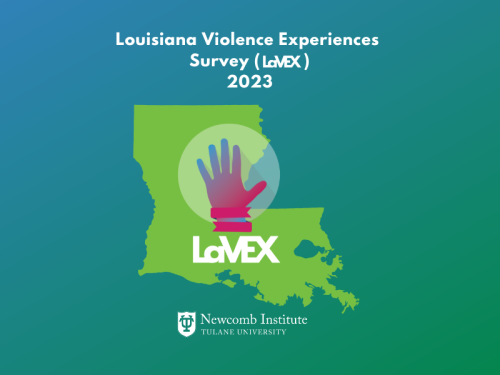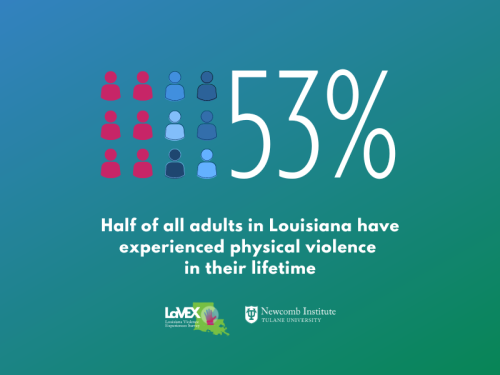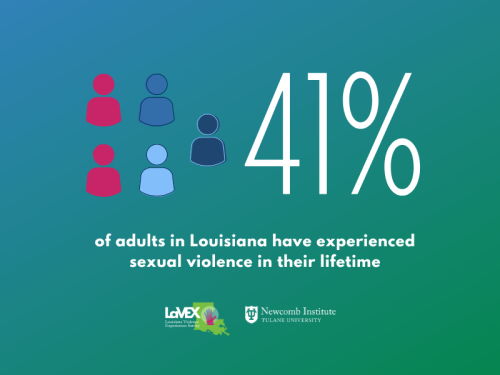New Tulane survey offers first comprehensive snapshot of violence prevalence across Louisiana

August 14, 2023
More than half of Louisiana residents experience physical violence in their lifetime, and about one in five are threatened or harmed with a gun, according to a new statewide survey by Tulane University researchers. Louisiana is only the second state in the nation to acquire this level of violence data and the first in the southeast. The survey was conducted in May and June.
The Louisiana Study on Violence Experiences Across the Lifespan (LaVEX), conducted this summer by the Newcomb Institute at Tulane University, surveyed more than 1,000 adults across the state on a comprehensive range of experiences of violence — from verbal insults and cyberbullying to sexual assault and gun violence. The survey gathered extensive data on how residents experience incidents of violence.
“This study offers a first-time documentation of the prevalence of violence occurring in Louisiana and shows that the majority of adults in the state have faced physical or sexual assaults,” said Anita Raj, Newcomb Institute executive director. “For many, these experiences first happen in childhood and adolescence, and create health and social impacts across one’s life.”
The study, the first known to comprehensively quantify the prevalence of violence as reported by Louisiana residents, might be more accurate than law enforcement figures since most victims never report their experiences to police.
Top findings include:
- More than half of Louisiana’s adult population (53%) has experienced physical violence. One in five (21%) have been threatened or harmed with a gun.
- One in 14 Louisiana adults (7%) experienced physical violence in the past year. Most past year physical violence (84%) was committed by someone known to the victim, and men were more likely than women to report past year physical violence.
- Two-fifths of adults in Louisiana (41%) have experienced sexual violence or harassment in their lifetime, one in three (29%) have been verbally sexually harassed, and one in nine (11%) have experienced sexual assault.
- For women, much of this violence is at the hands of a romantic or sexual partner; 42% of women have experienced physical and/or sexual violence from a partner, with about 1 in 10 of these women reporting that their partner threatened or harmed them with a gun.
- Approximately 90% of people who experienced violence never formally reported these assaults.
- Among those experiencing violence, most reported negative consequences, including feeling anxiety or depression, suicidality or missing work or school.


The full report is available at https://newcomb.tulane.edu/LaVEX.
Since 2020, the Center on Gender Equity and Health at the University of California San Diego has led the annual California Study on Violence Experiences across the Lifespan (CalVEX) survey. This year, in collaboration with the Newcomb Institute, the survey was expanded to Louisiana.
“The U.S. has no state-level survey data on these diverse forms of violence and their interconnection, outside of these data from Louisiana and California,” Raj said. “These two states are uniquely positioned to use evidence for violence prevention policy and programs and track population-level rates of change in violence over time.”
The findings confirm that Louisianans are regularly experiencing physical and sexual violence and discrimination, that they experience more gun violence than residents in the California survey, and that groups marginalized by economic vulnerabilities and social discrimination bear a greater burden of violence. Physical and sexual violence were reported more frequently by lesbian, gay, and bisexual respondents, people with disabilities, people with a history of homelessness or incarceration and those who faced prior year eviction or financial distress.
“Criminal justice responses to violence alone cannot address these concerns because most people do not report their experiences of violence,” Raj said. “Public health efforts for violence prevention are needed, with a focus on schools and work with adolescents, given that adolescence and young adulthood is the stage where violence escalates. Support for those affected by violence needs to include mental health services, such as formal counseling and lower cost emotional support services and economic programs to help ensure basic needs are being met.”
Raj will share her findings at the August 16 meeting of the Louisiana Women’s Policy and Research Commission in Baton Rouge.
